PRISM Speakers - November 2021 Insights
Our final event of 2021 took place on November 17th to coincide with LGBTQ+ STEM Day. This was our first foray into hybrid events, as we teamed up with the Business and IP Centre, Devon, and Tech Exeter to broadcast our event live from the Rougemont Room of Exeter Library.
We enjoyed an audience of 55 people in total, who joined us either in-person or online via Zoom. Our audience received welcome addresses by PRISM Exeter Founder and Chair, Dr Claire Davies, and BIPC Devon manager, Jo Lawrence, and were treated to talks from gay epigeneticist, Dr Jon Davies, and asexual quantum theory PhD student, Alexandre Coates.
Jon spoke about the work that he and other members of the Complex Diseases Epigenetics Group carry out to better understand how psychiatric disorders develop, and provided fascinating insights into how this work is conducted. Jon also spoke at length about research ethics and the considerations that need to be taken into account when deciding if something is safe to study and has worthwhile outcomes. At the end of his talk, Jon also reflected on his own experiences as a gay man in biosciences, explaining how a lack of support when he first came out impacted heavily on his grades at school and ultimately ended his career aspirations as a medical doctor. In cotrast, he explained how the supportive research group he has now enables him to thrive. A recording of Jon's talk is available to watch below (CONTENT WARNING: this talk contains references to miscarriage and infant mortality).
Alex used his research into open quantum systems as an analogy to explore the impact of external influences and environments on the people who do science. He explained how even theoretically isolated systems exhange energy with their external environment and used the example of a refridgerator to demonstrate this. Alex is also an award-winning PhD student representative and he took the audience through some of the changes he has pushed through at his university. In a poignant moment towards the end of his talk, Alex reflected on his sense of belonging in science - in terms of the way he dresses, his ethnicity, and his queerness - and the degree to which he could be described as "out" even when in LGBTQ+ spaces. A recording of Alex's talk is available to watch below.
Please note that audience questions and comments have been edited out of the recordings to protect the anonymity of attendees.
When registering for a ticket on Eventbrite, attendees were asked a series of questions, including where they were based, whether they had attended our events before, and what area of STEMM they work or study in. We also asked general demographic questions to assess whether we can improve our event advertising strategy.
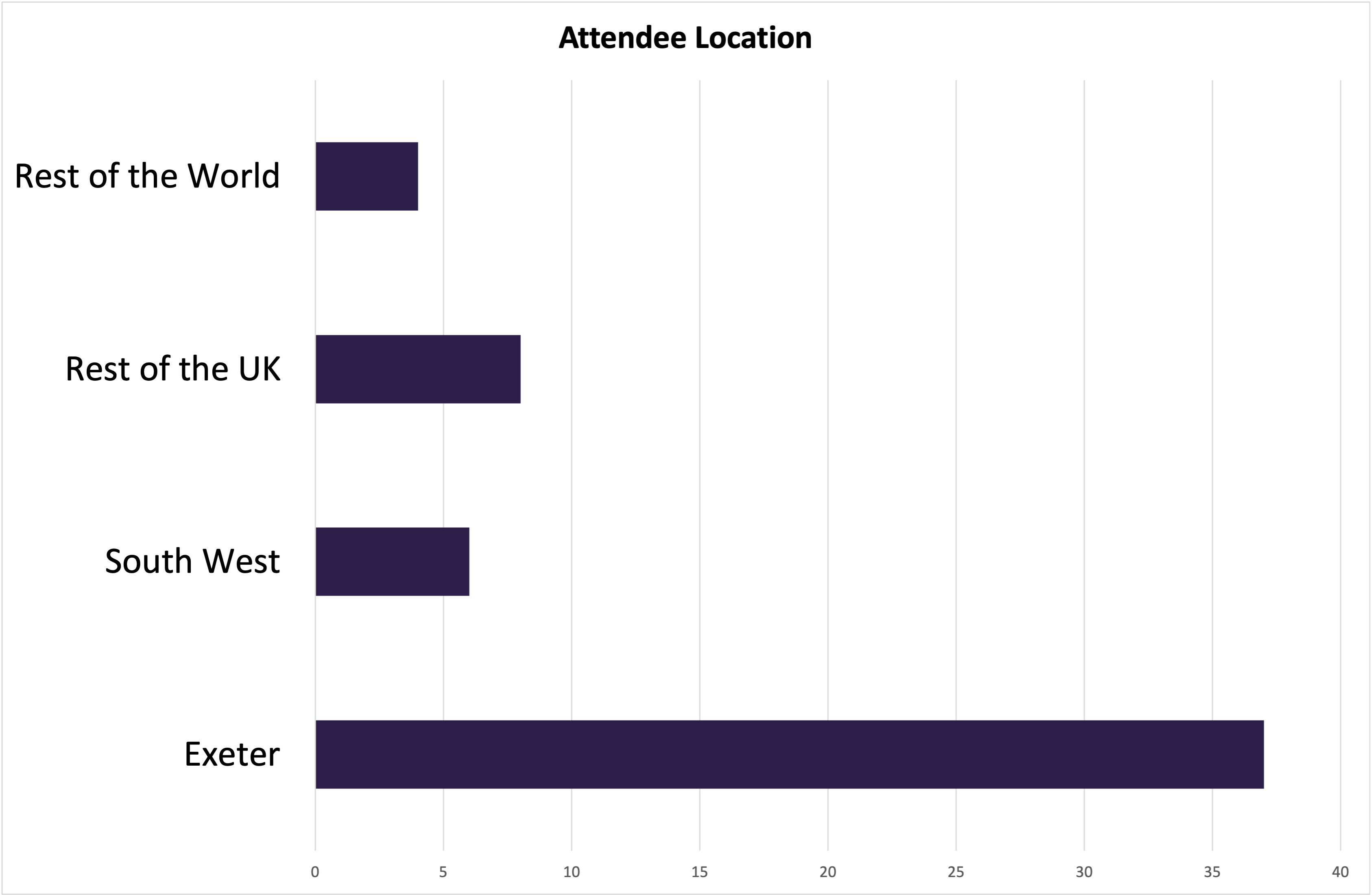 Our in-person audience was dominated, somewhat unsurprisingly, by people based
in the Exeter area while our hybrid format allowed for people to join from elsewhere.
Of the 8 people joining us from regions of the UK outside the South West of England,
3 joined from Scotland and 2 joined from Wales. Once again, we enjoyed an international
audience, welcoming overseas attendees from Switzerland, Spain, Kenya, and Canada.
Our in-person audience was dominated, somewhat unsurprisingly, by people based
in the Exeter area while our hybrid format allowed for people to join from elsewhere.
Of the 8 people joining us from regions of the UK outside the South West of England,
3 joined from Scotland and 2 joined from Wales. Once again, we enjoyed an international
audience, welcoming overseas attendees from Switzerland, Spain, Kenya, and Canada.
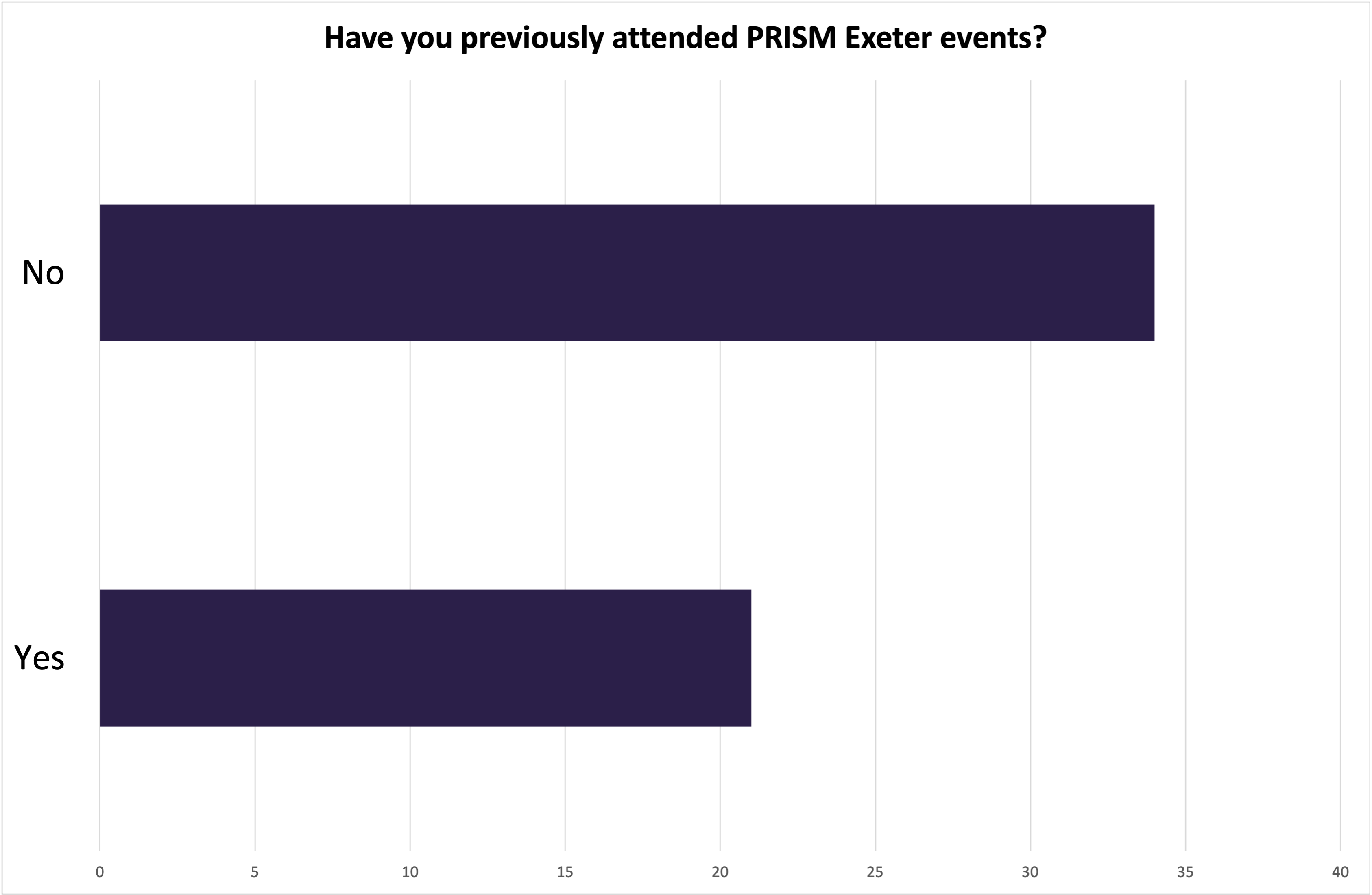 We once again enjoyed a substantial first-time audience and a healthy number of
repeat attendees. Repeat attendees were most likely to have heard about our event
through our newsletter (6) and work/university/college/school internal communications
(e.g. emails and bulletins) (8). First-time attendees reported hearing about the
event through work (etc) communications (15), via word of mouth (8), and via
social media (8). As always, we extend our thanks to everyone who helps to spread
the word about our events and we are delighted that our newsletter has grown to
170 subscribers in just over a year since its launch.
We once again enjoyed a substantial first-time audience and a healthy number of
repeat attendees. Repeat attendees were most likely to have heard about our event
through our newsletter (6) and work/university/college/school internal communications
(e.g. emails and bulletins) (8). First-time attendees reported hearing about the
event through work (etc) communications (15), via word of mouth (8), and via
social media (8). As always, we extend our thanks to everyone who helps to spread
the word about our events and we are delighted that our newsletter has grown to
170 subscribers in just over a year since its launch.
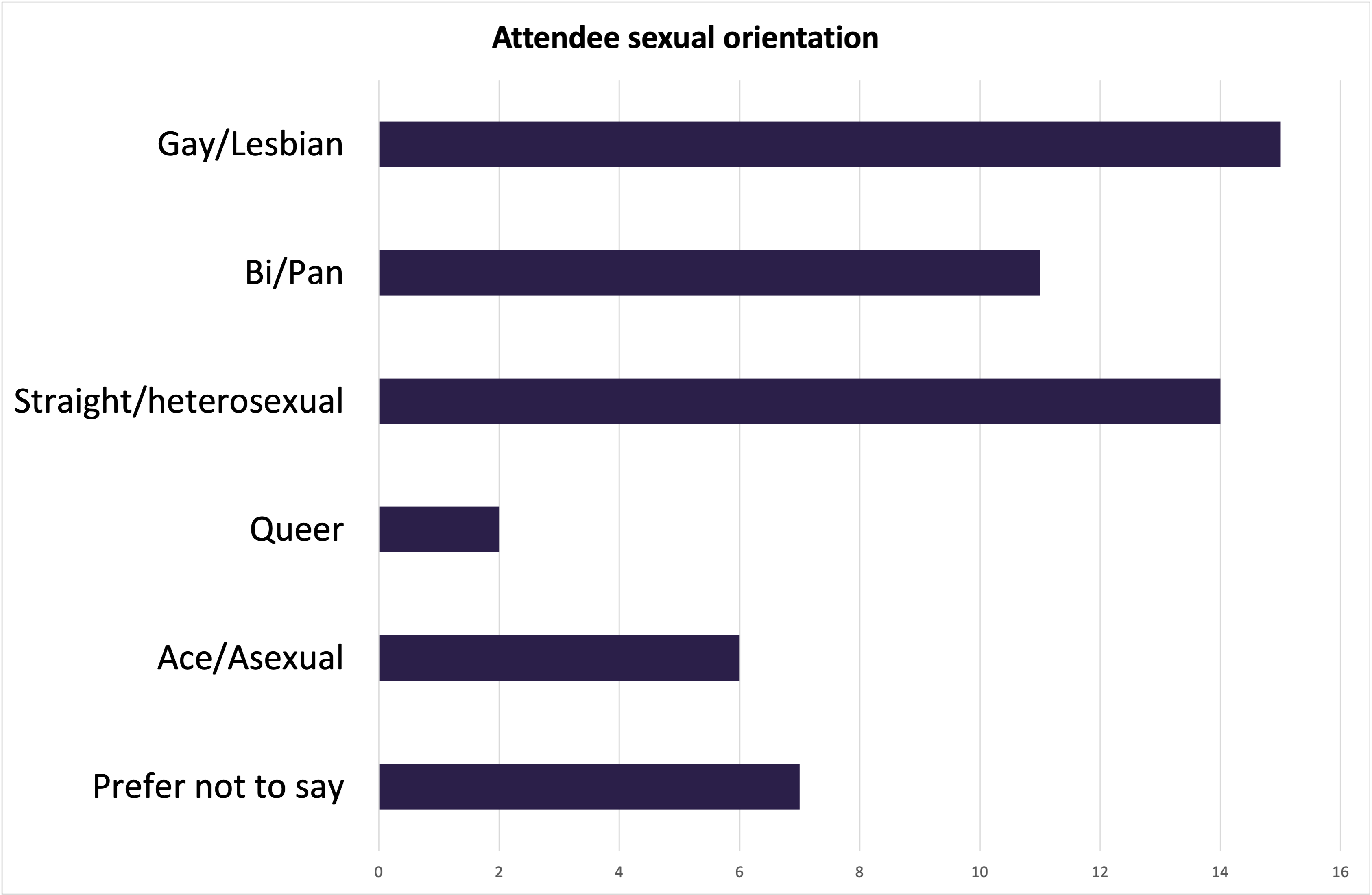 Everyone is welcome at our events, regardless of their sexual orientation.
Improving the experiences of LGBTQ+ individuals in STEMM is not possible without
allies shouldering some of the responsibility for change. We realise our events
provide a vital opportunity for learning and we are pleased to see continuing strong
attendance from straight/heterosexual people in our audiences (14). We also continue
to see that attendees are more likely to prefer not to respond to this question (7) than
other demographic questions we ask (e.g. age (3) and ethnicity (5)).
Everyone is welcome at our events, regardless of their sexual orientation.
Improving the experiences of LGBTQ+ individuals in STEMM is not possible without
allies shouldering some of the responsibility for change. We realise our events
provide a vital opportunity for learning and we are pleased to see continuing strong
attendance from straight/heterosexual people in our audiences (14). We also continue
to see that attendees are more likely to prefer not to respond to this question (7) than
other demographic questions we ask (e.g. age (3) and ethnicity (5)).
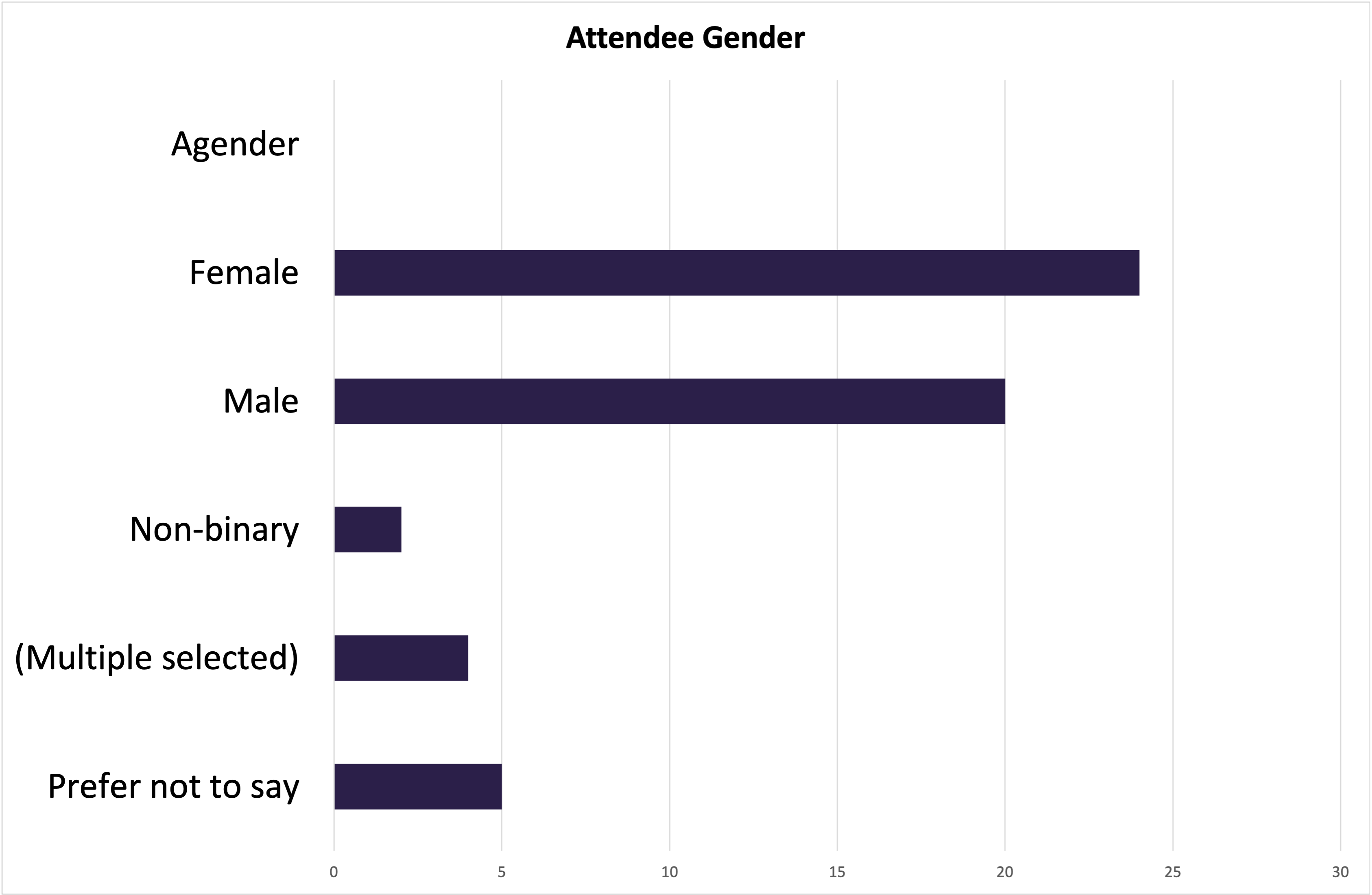 Attendees were also asked about their gender. We keep evaluating our default options
for this question, based on self-described entries from our surveys at our previous
events. And we always retain an option for attendees to self-describe. Four
attendees ticked multiple options: two selecting both Non-binary and Agender; one
selecting Female, Non-binary, and Agender, and one selecting both Female and
non-binary.
Attendees were also asked about their gender. We keep evaluating our default options
for this question, based on self-described entries from our surveys at our previous
events. And we always retain an option for attendees to self-describe. Four
attendees ticked multiple options: two selecting both Non-binary and Agender; one
selecting Female, Non-binary, and Agender, and one selecting both Female and
non-binary.
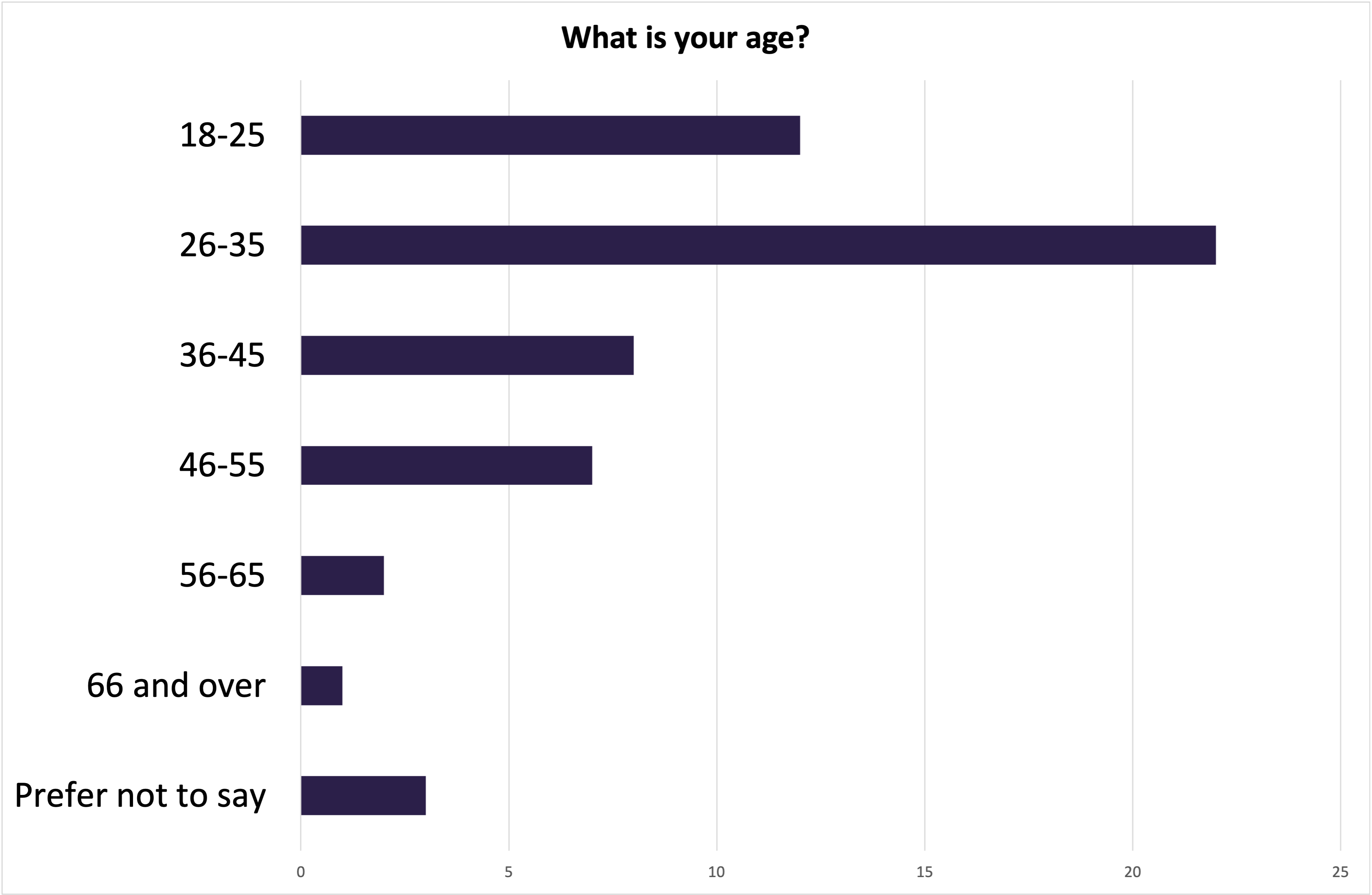 Attendees were also asked about their age and ethnicity. We are continuing to find
that our events are predominantly attended by young professionals. We do not know
the extent to which it is significant that this is the generation of individuals
who were educated under Section 28 in the UK. The majority of our
audience reported their ethnicity as White (75%) with 7% describing their
ethnicity as Asian or Asian British; 4% as Mixed or multiple ethnicities;
2% as Arab; and 2% as Black, African, Caribbean or Black British.
Attendees were also asked about their age and ethnicity. We are continuing to find
that our events are predominantly attended by young professionals. We do not know
the extent to which it is significant that this is the generation of individuals
who were educated under Section 28 in the UK. The majority of our
audience reported their ethnicity as White (75%) with 7% describing their
ethnicity as Asian or Asian British; 4% as Mixed or multiple ethnicities;
2% as Arab; and 2% as Black, African, Caribbean or Black British.
This event was organised using funding received from the Biochemical Society's Diversity in Science grant 2019 and the Society for Experimental Biology's Diversity Grant 2021. Alexandre Coates' travel and overnight accommodation were kindly funded by the Institute of Physics South West Branch . We are grateful to all these organisations for their support.